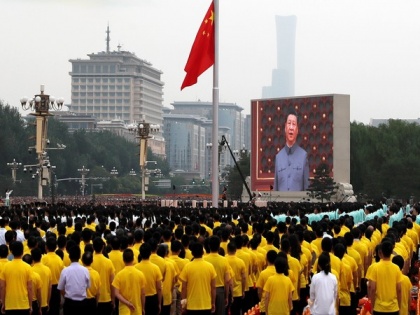Chinese stakes in 2022 high, but success is by no means guaranteed
By ANI | Published: January 1, 2022 08:12 PM2022-01-01T20:12:46+5:302022-01-01T20:20:02+5:30
The stakes of China in 2022 are undoubtedly high - from the Beijing Winter Olympics to the 20th Communist Party Congress in the fall, but success is by no means guaranteed. And numerous questions abound.

Chinese stakes in 2022 high, but success is by no means guaranteed
The stakes of China in 2022 are undoubtedly high - from the Beijing Winter Olympics to the 20th Communist Party Congress in the fall, but success is by no means guaranteed. And numerous questions abound.
Nectar Gan and Steve George, writing in CNN questioned China on numerous topics - As the coronavirus pandemic drags into its third year, will China remain isolated from the rest of the world? Will President Xi Jinping secure a third term in power that will result in a further tightening of control? What about China's place on the world stage? and Will we see a further deterioration in Beijing's relations with the West?
Come February, the global spotlight will again shine on Beijing -- the first city to host both the Summer and Winter Olympics. But the contrast between the two Games is stark.
Whereas the 2008 Summer Olympics was widely regarded as China's "coming out party" on the world stage (replete with the official theme song, "Beijing Welcomes You"), the 2022 Winter Games will be held within a tightly sealed Covid-safe "bubble" isolating participants and attendees from the wider Chinese population, wrote Gan and George.
As the Tokyo Summer Olympics has illustrated, pulling off a major international sporting event during a pandemic is no easy task.
Moreover, activists have long called for a boycott of the Games in protest of China's human rights abuses in Xinjiang and Tibet, as well as its political crackdown on Hong Kong.
Already, the United States and a number of allies have declared a diplomatic boycott of the Games, reported CNN.
Having endured successive coronavirus outbreaks and costly lockdowns, questions as to the sustainability of China ambitious zero-Covid strategy remain ever-present.
In Xi'an, an ancient city in northwest China, 13 million residents have entered their tenth day of home confinement as officials struggle to contain the country's largest community outbreak since Wuhan, the original epicentre of the pandemic, wrote Gan and George.
Over the past week, Chinese social media was inundated with cries for help from Xi'an residents facing shortages of food and other essential supplies, as stores were shuttered and private vehicles were banned from roads.
Access to medical services was also affected, with one university student recounting her experience of getting rejected by six hospitals to treat her fever.
Further, all signs point to Xi securing a historic third term in power during the ruling Communist Party's 20th National Congress in Beijing this fall, said Gan and George.
Xi, the most powerful Chinese leader in decades, had already abolished presidential term limits and enshrined his eponymous political ideology into the Constitution, reported CNN.
Under Xi, the party has tightened control on all aspects of society, from art and culture to schools and businesses. It has silenced ever more critical voices in public, wiped out a growing list of China's biggest stars, and extended its reach further into citizens' private lives.
Meanwhile, Xi has waged an ideological war against what he calls the "infiltration" of Western values -- such as democracy, press freedom and judicial independence -- and fanned a strand of narrow-minded nationalism that casts suspicion and outright hostility toward the West, reported CNN.
Also, the new year will pose some big challenges for the world's second-largest economy, said Gan and George.
Many economists project the growth of China as roughly 7.8 per cent. But 2022 is a different story, with major banks cutting their growth forecasts to between 4.9 per cent and 5.5 per cent. That would be the second slowest rate of growth since 1990, reported CNN.
Moreover, the international reputation of China has plummeted due to its initial mishandling of the Wuhan outbreak, the disinformation its diplomats and propagandists have spread abroad, its continued crackdowns on Xinjiang, Tibet and Hong Kong and increasingly assertive stance toward its neighbours.
Among the world's most developed countries, unfavourable views of China have reached record highs, according to the Pew Research Service.
The vast majority of the 17 countries surveyed by Pew last year hold broadly negative views of China - 88 per cent in Japan, 80 per cent in Sweden, 78 per cent in Australia, 77 per cent in South Korea and 76 per cent in the US.
( With inputs from ANI )
Disclaimer: This post has been auto-published from an agency feed without any modifications to the text and has not been reviewed by an editor
Open in app